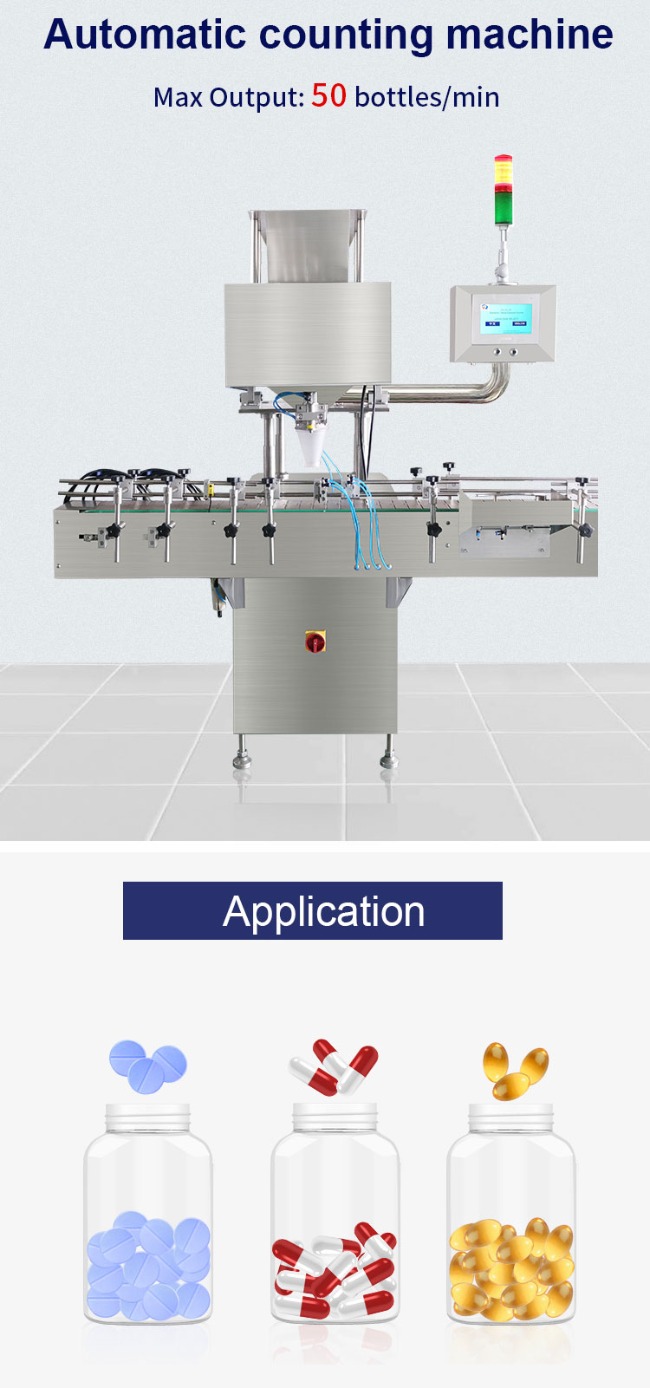Categories
New Blog
Tags
The pharmaceutical and nutraceutical industries are under constant pressure to deliver products that meet stringent quality, safety, and regulatory standards. Among the most labor-intensive and error-prone tasks in these sectors is the manual counting of capsules and tablets. Human errors in high-volume production lines can lead to costly recalls, compliance violations, and reputational damage. As global demand for medications and dietary supplements surges, automation has emerged as a game-changer. Capsule/tablet automatic counting machines are revolutionizing the packaging process by enhancing accuracy, ensuring compliance, and boosting operational efficiency. This article explores the technological advancements, real-world applications, and future trends shaping this critical segment of industrial automation.

Manual counting is inherently vulnerable to inaccuracies, particularly in high-speed production environments. Automatic counting machines eliminate human error through advanced optical sensors, vibration feeders, and microprocessor-controlled systems. These devices can process thousands of units per hour with near-perfect accuracy, reducing the risk of underfills or overfills. For instance, modern machines achieve counting precision rates of 99.9%, a stark contrast to the 95–98% accuracy typical of manual processes.
Pharmaceutical manufacturers must adhere to Good Manufacturing Practices (GMP) and FDA guidelines, which mandate traceability, documentation, and quality assurance. Automatic counters integrate seamlessly with quality control systems, generating real-time data logs for audits. Features like tamper-evident packaging support and defect detection (e.g., identifying broken or misshapen capsules) further align these machines with global regulatory frameworks.

From small-batch production for niche therapies to mass manufacturing of over-the-counter (OTC) drugs, automatic counting machines offer unmatched scalability. Modular designs allow manufacturers to adjust throughput from 50 to 1,000 bottles per hour, while rapid changeover capabilities accommodate diverse product sizes and formulations without downtime.
- Bulk Counting for Blister Packaging and Bottle Filling: Automatic counters are indispensable in preparing precise doses for blister packs and bulk containers. For example, in COVID-19 vaccine production, these machines ensured rapid, error-free packaging to meet global distribution timelines.

The nutraceutical industry faces unique challenges due to the diversity of capsule sizes (from 000 to 5) and hybrid formulations (e.g., probiotics with enteric coatings). Automatic counters equipped with adjustable feed trays and multi-channel sensors handle this variability effortlessly, ensuring compliance with label claims.
In clinical trials, precise dosing is non-negotiable. Automatic counting machines enable researchers to prepare small, customized batches with milligram-level accuracy. This capability is also critical for compounding pharmacies producing patient-specific medications.
The integration of IoT sensors and cloud-based analytics is transforming counting machines into smart nodes within Industry 4.0 ecosystems. Real-time monitoring of machine performance, predictive maintenance alerts, and remote diagnostics minimize downtime. For example, a European pharma company reduced maintenance costs by 30% after adopting IoT-enabled counters that flagged bearing wear before failures occurred.
Automatic counters contribute to sustainability goals by optimizing material usage. By minimizing overfilling, manufacturers reduce plastic waste in bottles and blister packs. Some systems also support recyclable or biodegradable packaging materials, aligning with the EU’s Circular Economy Action Plan.
The rise of precision medicine demands flexible production systems. Automatic counting machines enable small-batch runs of gene therapies or oncology drugs tailored to individual genetic profiles, a trend accelerated by FDA’s support for decentralized manufacturing.
Aging populations in regions like North America and Europe are driving OTC sales for pain relievers, vitamins, and cold medications. Automatic counters allow retailers to streamline shelf-ready packaging while adhering to strict dosage guidelines.

Innovative applications are emerging beyond traditional sectors. Cosmetic companies use automatic counters to package capsule-based serums and effervescent skincare products. In veterinary medicine, the machines ensure accurate dosing for pet medications, a market projected to grow at 6.8% CAGR through 2030.
Irregularly shaped tablets (e.g., chewables for children) and hybrid capsules with liquid cores pose technical challenges. Manufacturers are addressing this via 3D vision systems and adaptive vibration feeders that adjust in real time to product geometries.
Machine learning algorithms are enhancing defect detection and pattern recognition. A recent innovation involves AI models trained on thousands of images to differentiate between acceptable color variations and actual defects, reducing false rejection rates by 40%.
Capsule/tablet automatic counting machines are no longer a luxury but a necessity for modern pharmaceutical and nutraceutical supply chains. By combining precision, regulatory compliance, and scalability, these systems address critical pain points in quality control and operational efficiency. As smart manufacturing and personalized medicine reshape the industry, early adopters of automation will gain a competitive edge in compliance, sustainability, and market agility. For businesses aiming to future-proof their operations, investing in advanced counting technology is not just strategic—it’s imperative.